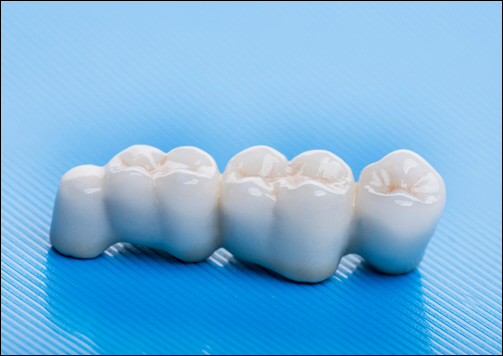Dental Bridges: Enhancing Smiles and Restoring Function
Dental bridges offer an effective solution for replacing missing teeth, providing both aesthetic and functional benefits. These enhance your smile and support oral health. When a tooth is lost, it can impact not only your appearance. It also affects your ability to chew, speak, and maintain proper alignment in the mouth. Dental bridges fill these gaps, helping patients regain confidence in their smile while restoring essential functions.
How Dental Bridges Work
 A dental bridge is a prosthetic device that consists of one or more artificial teeth, known as pontics, which are anchored in place by the surrounding teeth or, in some cases, dental implants. The bridge literally “bridges” the gap left by missing teeth, restoring a full smile and preventing the surrounding teeth from shifting out of alignment.
A dental bridge is a prosthetic device that consists of one or more artificial teeth, known as pontics, which are anchored in place by the surrounding teeth or, in some cases, dental implants. The bridge literally “bridges” the gap left by missing teeth, restoring a full smile and preventing the surrounding teeth from shifting out of alignment.
There are different types of dental bridges, including traditional bridges, which rely on crowns placed over the adjacent teeth, and implant-supported bridges, which use implants as a sturdy foundation. Dentists customize each bridge to fit the patient’s mouth precisely, ensuring comfort, durability, and a natural look.
Enhancing the Appearance of Your Smile
Missing teeth can make you feel self-conscious about your smile, but dental bridges offer a seamless way to restore a complete, natural look. Modern bridges are made with materials like porcelain and ceramic, which mimic the color and translucency of natural teeth. Dentists take care to match the bridge to your existing teeth, creating a flawless smile that blends in perfectly with the surrounding teeth.
Beyond aesthetics, dental bridges provide important structural support to your face, preventing the sunken appearance that often accompanies tooth loss. By filling in gaps, bridges help maintain the shape of your face, giving you a fuller, more youthful appearance.
Restoring Function for Better Health
Tooth loss can make it difficult to chew food properly, potentially leading to digestive issues and limited dietary choices. With a dental bridge, patients regain full chewing functionality, allowing them to enjoy a balanced diet and improve overall health. The bridge’s stability helps distribute the force of chewing evenly across the teeth, preventing unnecessary stress on remaining natural teeth.
Dental bridges also play a key role in restoring speech clarity. Missing teeth, especially front teeth, can affect pronunciation, leading to speech issues. By filling the gaps, a bridge helps patients speak more clearly and confidently.
Protecting Long-Term Oral Health
When a tooth is lost, surrounding teeth often begin to shift toward the empty space, leading to misalignment, bite issues, and even gum disease. A dental bridge holds neighboring teeth in place, maintaining proper alignment and preventing further oral health complications. Proper alignment reduces the risk of enamel wear and jaw joint strain, both of which are common issues for people with missing teeth.
Dental bridges also make it easier to maintain good oral hygiene. While cleaning around a bridge requires some special care, it’s far easier than dealing with the challenges of missing teeth. Regular brushing, flossing, and dental check-ups help keep the bridge and surrounding teeth healthy for years to come.
Revitalize Your Smile with a Dental Bridge
Dental bridges offer a practical, reliable solution for missing teeth, enhancing smiles and restoring critical functions. If you’re missing one or more teeth, talk to your dentist about how a dental bridge can bring back the appearance, comfort, and functionality of your smile. With the right bridge, you’ll not only improve your oral health but also gain the confidence that comes from a complete, beautiful smile.


